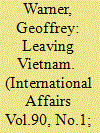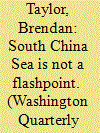| Srl | Item |
| 1 |
ID:
131422


|
|
|
|
|
| Publication |
2014.
|
| Summary/Abstract |
Although anticipated, the North Vietnamese 'Easter offensive' against South Vietnam in 1972 created problems for the United States. Having reached a rapprochement with Communist China, President Nixon and his foreign policy adviser, Henry Kissinger, believed that the attack could have serious repercussions for their attempt to balance it with détente with the Soviet Union, not to mention the US's credibility as a Great Power. They also feared it would damage Nixon's prospects for re-election in November 1972. Despite opposition from his Defense Secretary, Nixon renewed the bombing of North Vietnam which had been stopped by President Johnson in 1968. This helped to bring the North Vietnamese back to the conference table and after complex negotiations, a draft peace agreement was ready for initialling in October 1972. However, President Thieu of South Vietnam saw significant drawbacks in the agreement and refused to go along with it. The North Vietnamese chose to have one more attempt to win on the battlefield and President Nixon, who had scaled down the bombing when peace seemed closer and won a landslide victory in the presidential election, launched another eleven days of concentrated bombing raids on North Vietnam at the turn of the year. This led to the final agreement initialled on 23 January 1973, which President Thieu reluctantly acceded to. Thieu's reservations were justified, but Nixon realized that, despite his electoral victory, he could not count on the continued support of Congress and the American people for the war. Far from bringing 'peace with honor in Vietnam and Southeast Asia', the January agreement was a fig leaf to cover American withdrawal.
|
|
|
|
|
|
|
|
|
|
|
|
|
|
|
|
| 2 |
ID:
133691


|
|
|
|
|
| Publication |
2014.
|
| Summary/Abstract |
China is aiming to extend the land in the reefs it controls in the disputed Spratly Island, building an airstrip and port, amid condemnation from the Philippines and Vietnam, James Hardy looks at the long term consequences of Beijing's construction.
|
|
|
|
|
|
|
|
|
|
|
|
|
|
|
|
| 3 |
ID:
133779


|
|
|
|
|
| Publication |
2014.
|
| Summary/Abstract |
Two important anniversaries arrive in 2014 for protracted South China Sea disputes. January 19 marked 40 years since Chinese and Vietnamese forces clashed over the Paracel Islands, resulting in the deaths of more than 50 Vietnamese personnel and an undisclosed number on the Chinese side-at least the second-largest loss of life to have occurred in any single incident involving these disputed waters. Late 2014 will also mark 20 years since China controversially built structures on the aptly named Mischief Reef in the Spratly Islands, prompting a further series of incidents at sea. Recent reports that China has moved large concrete blocks to Scarborough Shoal-yet another disputed reef that was the scene of an April 2012 standoff between Chinese and Philippines vessels-have sparked concerns in Manila that history is repeating.
|
|
|
|
|
|
|
|
|
|
|
|
|
|
|
|